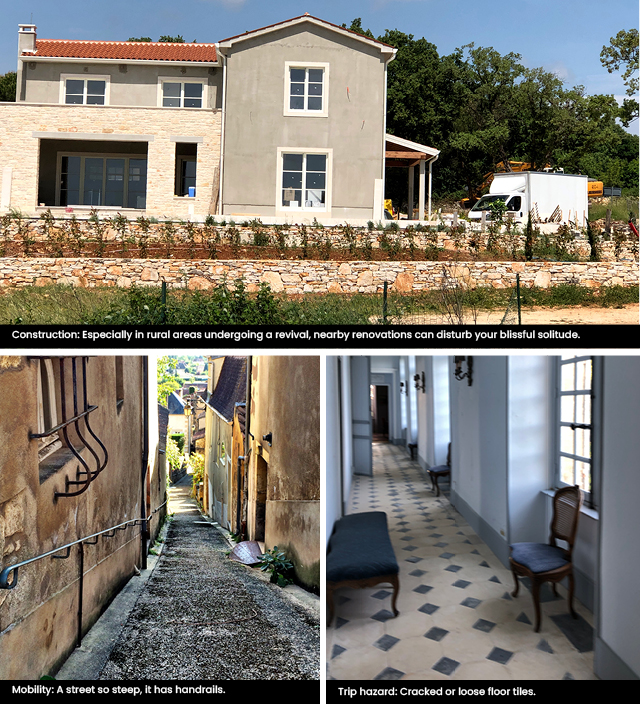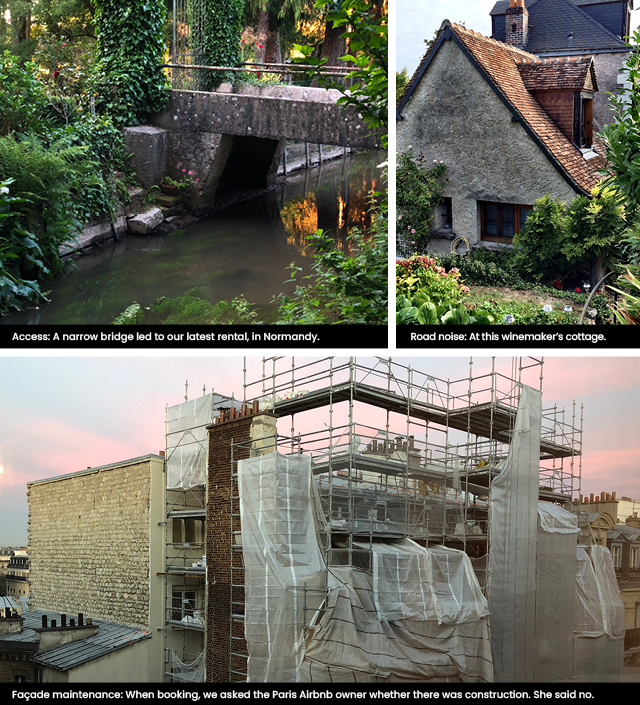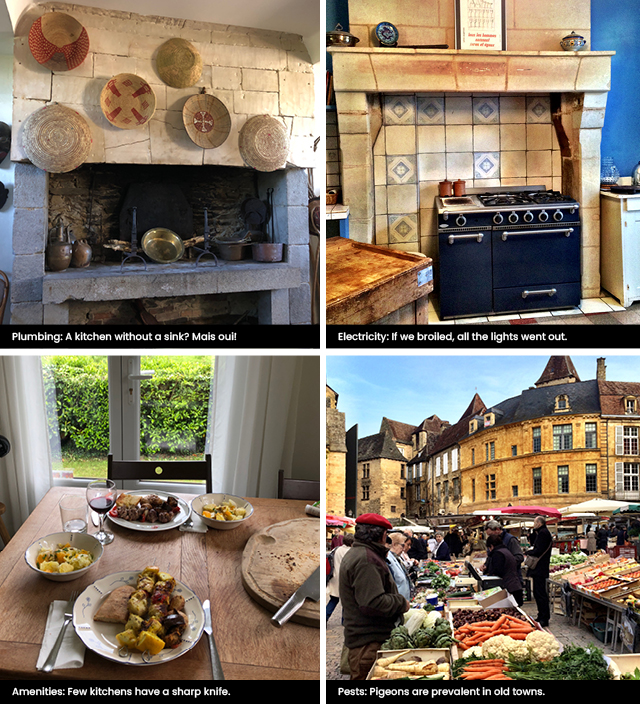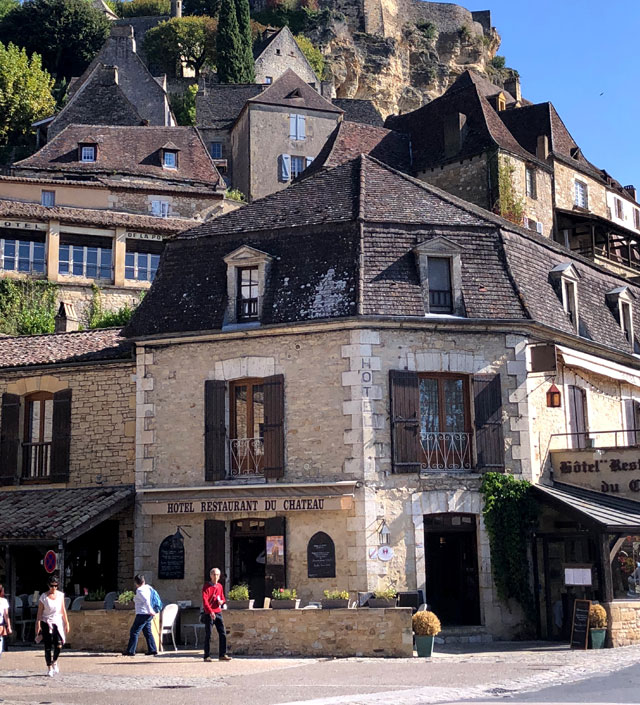In the hunt for European lodgings, I consider myself a sophisticated Airbnb “guest.” Since 2015, with a one-year hiatus due to the pandemic, my husband and I have spent several months of the year building a portfolio of properties that we like enough to rent repeatedly but wouldn’t want to own.
During that time, we have had lengthy stays (up to six weeks) in dozens of houses and a few apartments, mostly in rural areas. Highlights have included an 18th-century Normandy château where we cocooned for the first two weeks of September last year; an exquisite triplex in a former Basque shipbuilder’s mansion at the foot of the Pyrenees; and a 14th-century cottage on the ramparts of a medieval Dordogne village.
Comfort and ambiance are more important to us than they might be to those who spend all day sightseeing. All the more so, since I also write from the road. So while online photos and reviews rarely tell the whole story, we scrutinize them in an effort to avoid unpleasant surprises – about nearby noise, lumpy beds or pigeon infestations, for example. But sometimes, just when we think we’ve seen it all, we find ourselves humbled by a new situation.
That’s what happened last month, in the medieval hilltop village of Motovun, Croatia. There our host neglected to tell us that we would need a Sherpa to get our luggage to the front door.
An Impossible Situation
We knew that no one would be greeting us at the house that we had rented for three days on a pedestrian-only street. But from the listing, the procedure sounded like so many other similar places we had rented in medieval villages – challenging but manageable. Except that it wasn’t. One reason was that the host had misrepresented the distance from the luggage drop-off area. Another was that it was impossible to wheel our suitcases over the extremely uneven, hilly cobblestone path that led to the house.
Additional Reading: Building a Portfolio of European Vacation Rentals
Having sized up the situation, we considered the possibility of repacking to take just our valuables and three days’ worth of clothing, and leaving the rest in the car. But that would have exposed us to the possibility of theft, since the car park (half a mile from the house) was not secure. We canceled the reservation and holed up in a dumpy hotel for the night while we regrouped.

Our dispute with the host got kicked around for 15 days in Airbnb’s resolution process while we played Airbnb roulette. (Ultimately, we got a full refund.) In the process, we discovered a rural renaissance in Croatia that’s creating attractive alternatives to lodgings in towns like the famous one where we had initially booked.
And despite the latest setback, our track record has been good enough that we remain firmly committed to this lifestyle. Mostly we have been inconvenienced, or sometimes exasperated, by the things Airbnb hosts won’t tell you. Here are some others.
You’ll be living in a construction zone.
In Paris, where disturbances from façade maintenance (ravalement de façade) are common, we closely question hosts, both at the time of booking and shortly before check-in, and once canceled a reservation when an owner hadn’t been truthful.
But even in rural areas, one can’t take anything for granted, as we recently discovered in a tiny village at the edge of a vineyard on Croatia’s Istrian peninsula. Awakened early each morning by sunshine streaming into our bedroom, we flung open the doors onto the adjacent porch, inhaled the scent of the rosemary bushes bordering the property and listened to the singing swallows. About an hour later, the heavy machinery arrived to do construction on not one, but two, nearby properties.

The spacious house, with a swimming pool, was immaculate, well maintained and a better value than many nearby hotels. And until June 15, when local authorities require construction to stop for the three-month high season, there’s so much of it in this heavily touristed part of Croatia that it’s hard to avoid. Still, it would have been nice if the host had told us, and given us a choice.
Layout and location surprises await.
We steer clear of listings with photos of loft beds. And having once rented a house where the bathroom was on a different floor from the bedroom, have avoided that situation in future rentals by asking, if there’s any doubt. Unless the comments mention it, though, you won’t know about other layout quirks. In the Normandy château we rented last year, for example, there was no plumbing in the vast cook’s kitchen, so everything had to be carried to the adjacent scullery where there was a double sink and dishwasher. Fortunately, this somewhat ramshackle property had other virtues and was being offered at a pandemic discount.
Wanting to go back to that region this spring, we spent our final day there looking at real estate and noticed another potential drawback that hosts didn’t mention. Several listings of potential interest in bucolic-looking areas were so close to an “autoroute” (aka “A-road”) that one could hear the traffic.
Road noise can be surprisingly bothersome in the countryside, even when it doesn’t involve a superhighway, and it’s rarely mentioned in either the listing or guest comments. Therefore, it’s best to ask about nearby roads before booking. Only once you have made the reservation can you independently confirm the exact location. Typically, there’s at least a short period after that when you can cancel without penalty.
By the time you leave, you’ll know how everything works (or doesn’t).
Unless they’ve stayed at vacation rentals themselves, most hosts can’t conceptualize what it’s like to move into an unfamiliar home in a foreign country. Though Airbnb provides an easy way for them to integrate the Wi-Fi code into online arrival instructions, most don’t use it, or even leave a cheat sheet, with that and other essential information, in plain view at the premises.
“I don’t know the password. I keep meaning to write it down,” hosts at two separate properties told us recently, suggesting that we try using the string of characters printed on the bottom of the router. (Fortunately, in both cases it worked.) At an apartment in San Sebastián, Spain, that we rented several years ago, the owner had changed the password and forgotten to update the house manual. But at least there was a house manual. More often there isn’t.
Washing machines, which we urgently need during long-term travel, continue to confound. This despite the fact that many European ones use icons, rather than words, to indicate various wash cycles. A couple of times, after doing a load of laundry, we had difficulty opening the door to retrieve our clothes. Once we solved the problem by unplugging the machine. On another, after downloading the English manual for the Gorenje SensoCare, we discovered that what we mistook for a broken door handle was, in fact, a lever that one must lift to open the machine door. Duh.
We’ve learned, from experience, to ask certain questions at check-in — and the opportunity to do that is a good reason to have human contact, rather than retrieve keys from a lockbox and let yourself in. A new item on our list involves solar energy. After the temperature suddenly dropped 30 degrees during our Croatian sojourn, it dawned on us during a cold shower that the water heater probably defaulted to solar and that we didn’t know how to activate the electric backup. Three hours later the owner arrived to flip the necessary switch, which was behind a locked door.
In other modern or recently renovated properties, we inquire about childproof locks (for example, on washing machines, ovens and electric stovetops) that may also be semi-adult-proof. In one Croatian rental, they were integral to all the electric outlets; fortunately, it took only a few minutes of fiddling for us to figure out how they worked.
And speaking of electricity, we now ask what to do if the power goes off, because wiring problems abound. Typically, it’s an appliance short-circuit (for example, on an electric kettle, toaster or ceiling fixture), or operating two devices at a time, that causes the blackout. Before we added this item to our checklist, we had spent half a day in the dark waiting for the host to return from hiking the Camino de Santiago; in that house, and one other in which we experienced a power failure, the control panel was securely shut off from our living quarters.
If you plan to cook, bring a field kitchen.

It’s amazing how many useless items I find in Airbnb kitchens. In one, which looked like a repository for never, or rarely, used wedding gifts, there was a giant gelato maker and two panini machines (one of which I used to make toast). In another, there were three apple-peeling devices. But it’s a rare kitchen with a decent knife, so I bring two of my own — a chef’s knife and a smaller, paring one.
I carry them in a rectangular packing cube that I call my field kitchen, and which contains a few other items that make it possible for me to cook a meal almost anywhere. It also includes a rubber spatula, a pair of bamboo tongs and a Vietnamese drip coffeemaker that I bought in Hanoi several years ago for $1.35. I bring a small quantity of coffee, too, because most homes either don’t have coffee in the cabinet, or don’t have the particular pods or filters needed to operate whatever type of coffeemaker one finds there. And, especially on the first morning in a new Airbnb, I need a strong cup of coffee to help me cope with some of the things that hosts haven’t told me.
I blame anything that’s broken on the last guest.
Often, it’s the locks, because there’s some little trick to opening the door or removing the key that previous guests weren’t clairvoyant enough to surmise. And the natural inclination when this happens is to exert enough force that some part of the mechanism accidentally breaks. So, whether we’re met by the host, a cleaning person or a property manager, we ask for a locks lesson and a chance to practice a few times before being left on our own. And we don’t care how ridiculous this might seem to our hosts.
Don’t expect a hotel-like experience.
You won’t hear this before check-in, but it’s a popular refrain if you call attention to faulty equipment or missing supplies. It was the defensive retort of one Croatian host when we inquired about whether there was soap for the washing machine, tabs for the dishwasher, charcoal for the barbecue and extra toilet paper. (The answer in each case was no.) We were asking only because we were about to go shopping and wanted to make a list of what we needed. These are all things we often end up buying, and toting with us, from one Airbnb to the next, until the end of a trip.
On a handful of occasions, we have also purchased the European equivalent of Drano and used it to unclog a shower. And since we are homeowners ourselves, and don’t expect a hotel-like experience, we have never mentioned it to our hosts.
In the Normandy Airbnb where I am writing this article, our host raised a potentially troublesome issue — once we got here. In the course of orienting us to the house, which we rented for the month of June, she disclosed that there were mice in the basement. And by the time we arrived, they had apparently consumed a great deal of the poison she had distributed.
“As they dry out, it will stop smelling,” she assured us as she showed us around. This turned out to be true, and we were much more understanding of the situation than if she had left us to discover it for ourselves.
Once in a while, though, we come across a host whose extreme attention to our comfort is even better than we’ve found at most hotels. That was true of Toni Jadrijevic, whose Airbnb in Split, Croatia, we recently rented for just one night. His place is a walk-up in the pedestrian-only part of Old Town, above a bar that he also owns. And, coincidentally, we arrived on the Feast of Saint Domnius (Sveti Duje), which happens to be the busiest, noisiest day of the year there.
It could have been a very unpleasant experience, but Toni did everything to preempt problems. His listing mentioned the triple-glazed windows. Since they made the din almost inaudible, we don’t blame him for not telling us there was a bar downstairs. As our arrival date approached, he sent specific instructions about where to have an Uber driver drop us off. When the time came, he met us with our luggage, ushered us to the apartment and toted the heaviest items upstairs. And at checkout the following morning, he cheerfully went through all the same steps, in reverse, so we never had to struggle.
That, plus his suggestions on how to optimize our visit to Split, greatly enhanced our time in his creatively renovated, immaculately clean little nest. It was an ideal Airbnb experience, and left us thinking: There are a few things we wish Toni could tell some of our other hosts.
Deborah L. Jacobs, a lawyer, entrepreneur and award-winning journalist, is a former senior editor at Forbes. She is the author of “Four Seasons in a Day: Travel, Transitions and Letting Go of the Place We Call Home” and “Estate Planning Smarts: A Practical, User-Friendly, Action-Oriented Guide.” Follow her on Twitter at @djworking and join her on Facebook here.







